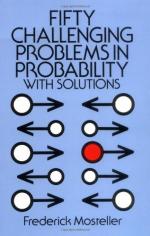|
This section contains 960 words (approx. 4 pages at 300 words per page) |

|
The experimental probability of an event is defined as the ratio of the number of times the event occurs to the total number of trials performed. As a consequence of this definition, experimental probability is not a fixed value but varies depending on the particular set of trials on which it is based.
As with theoretical probability, the possible values of the experimental probability range from 0 to 1. An event would have an experimental probability of 0 if, during the trials performed, that outcome never occurred. But unlike theoretical probability, experimental probability bases its value solely on the results of the experiment, rather than assuming that certain events are equally likely to occur.
Conducting Experiments
Performing experiments for the purposes of determining experimental probabilities can provide powerful insights into the nature of probability. Rolling dice, tossing coins, drawing marbles from a hat, and selecting playing cards from a...
|
This section contains 960 words (approx. 4 pages at 300 words per page) |

|


